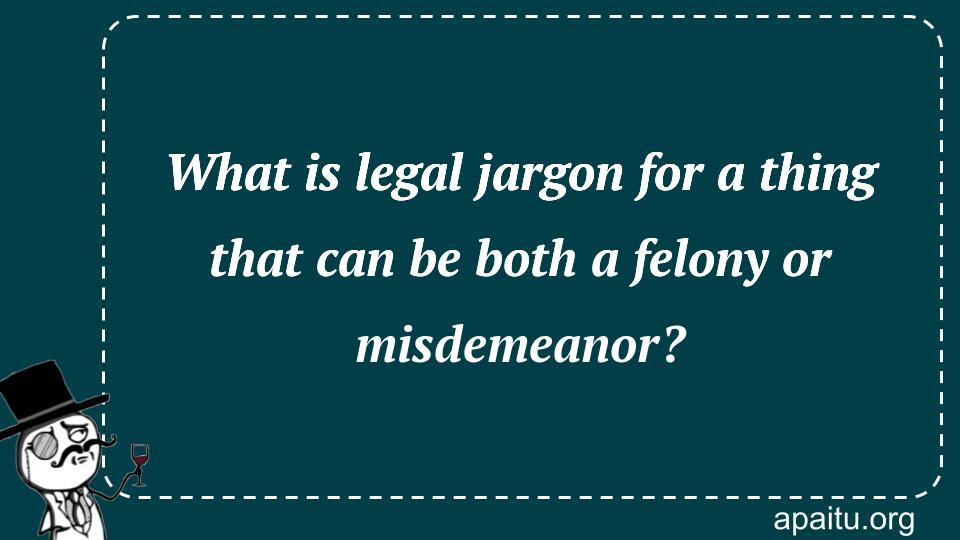Question
Here is the question : WHAT IS LEGAL JARGON FOR A THING THAT CAN BE BOTH A FELONY OR MISDEMEANOR?
Option
Here is the option for the question :
- Flipper
- Shaker
- Wobbler
- Mover
The Answer:
And, the answer for the the question is :
Explanation:
If a crime is referred to as a “wobbler,” it indicates that it has the potential to be prosecuted as either a felony or a misdemeanor, depending on the circumstances of the case. The accused is more likely to agree to the lesser charge in order to avoid the heavier penalty associated with the felony, which is why many state prosecutors employ wobblers as a pathway to secure a plea deal. Felony penalties are more severe than terms associated with minor crimes.

In legal terminology, a wobbler is a criminal offense that can be classified as either a felony or a misdemeanor, depending on the specific circumstances of the case. The term “wobbler” comes from the fact that the offense can “wobble” between being a felony or misdemeanor.
Wobblers are often used for crimes that are considered less serious than other felonies, but still carry significant penalties. Common examples of wobblers include assault with a deadly weapon, grand theft, and drug offenses.
The classification of a wobbler as a felony or misdemeanor is usually determined by the prosecutor and the judge based on a number of factors, including the severity of the offense, the defendant’s criminal history, and the specific circumstances of the case. In some cases, the defendant may be able to negotiate a plea deal with the prosecutor in order to have the offense reduced from a felony to a misdemeanor.
The classification of a wobbler as a felony or misdemeanor can have significant consequences for the defendant. A felony conviction can result in a much longer prison sentence, as well as a range of other consequences, such as the loss of voting rights, the inability to own firearms, and difficulty finding employment. A misdemeanor conviction carries fewer consequences, but can still result in fines, probation, and a criminal record.
The use of wobblers in criminal law is controversial, with some critics arguing that they give prosecutors too much power to determine the severity of a defendant’s sentence. Others argue that wobblers provide flexibility in the criminal justice system and allow for more individualized sentencing.
In some states, there are specific guidelines for classifying offenses as wobblers. For example, in California, certain offenses, such as grand theft and assault with a deadly weapon, are classified as wobblers if the defendant has no prior felony convictions. However, if the defendant has a prior felony conviction, the offense is automatically classified as a felony.
a wobbler is a criminal offense that can be classified as either a felony or a misdemeanor, depending on the specific circumstances of the case. Wobblers are commonly used for offenses that are considered less serious than other felonies, but still carry significant penalties. The classification of a wobbler as a felony or misdemeanor is usually determined by the prosecutor and the judge based on a number of factors, and can have significant consequences for the defendant. The use of wobblers in criminal law is controversial, with some critics arguing that they give prosecutors too much power to determine the severity of a defendant’s sentence.